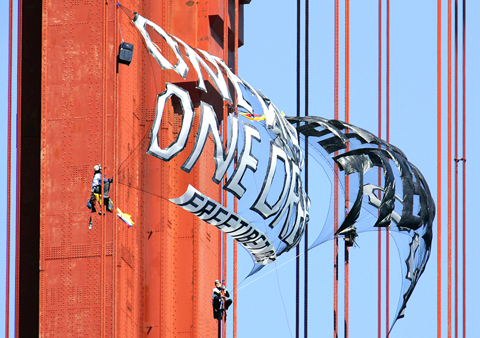Senior Olympic officials yesterday raised the prospect for the first time of abandoning the international legs of the Beijing Games torch relay, amid a wave of protests targeting the flame overseas.
The protests continued on Monday with a dramatic stunt at San Francisco’s Golden Gate Bridge, two days before the torch’s arrival to the city. Police appeared to have been caught cold by the protest, during which demonstrators scooted up the bridge’s cables using climbing gear and unfurled two giant banners.
The torch relay for Beijing and future Games will be reviewed at a meeting of International Olympic Committee (IOC) chiefs in Beijing beginning on Thursday, Gunilla Lindberg, a vice president of the IOC, told reporters.

PHOTO: AP
“I am sure it will be discussed. I think we need to have a full review,” Lindberg told reporters when asked if she thought the IOC would scrap the overseas legs of the Beijing torch relay.
Other senior IOC officials who are in Beijing to prepare for the August Games spoke bitterly of the demonstrations that have marred China’s efforts to stage the most ambitious torch relay ever.
“All I can say is we are desperately disappointed,” IOC board member Kevan Gosper said.
“[Activists] just take their hate out on whatever the issues are at the time,” Gosper said.
Campaigners are trying to raise publicity about Beijing’s controversial rule of Tibet and a wide range of human-rights abuses in China.
On Monday, the torch relay had to be dramatically cut short in Paris due to disruptions by hundreds of protesters. Widespread protests also disrupted the previous day’s leg in London, while activists promised more of the same in Australia, India, Thailand, Japan and elsewhere.
China’s Foreign Ministry yesterday angrily denounced the protests in Europe against the torch relay as “sabotage” by Tibetan separatists.
Gosper and other IOC officials said they would discuss whether to completely abandon the concept of taking the torch around the world for future Games. Gosper said the IOC might prefer a return to a relay program that would see the torch lit in Greece and then transferred to the host country.
Meanwhile, 11 foreign journalists were scheduled to depart yesterday for western China on a tour organized by China’s Foreign Ministry.
The second tour for foreign media of areas that saw mass Tibetan protests recently will fly to Lanzhou, Gansu Province, where more than 1,000 Buddhist monks led protests.
At the end of last month, journalists were taken on a highly regimented three-day trip to Lhasa. Their tour was interrupted by 30 monks at Jokhang Temple, who shouted about the lack of freedom in Tibet and rebutted China’s claims that the Dalai Lama had fomented the riots.
In related news, US Democratic presidential hopeful Senator Hillary Clinton urged President George W. Bush on Monday to boycott the opening ceremony of the Beijing Olympics.
Clinton, in a statement, cited violent clashes in Tibet and the lack of pressure by China on the Sudanese government to stop “the genocide in Darfur.”
“I believe President Bush should not plan on attending the opening ceremonies in Beijing, absent major changes by the Chinese government,” the New York senator said.

SECURITY: As China is ‘reshaping’ Hong Kong’s population, Taiwan must raise the eligibility threshold for applications from Hong Kongers, Chiu Chui-cheng said When Hong Kong and Macau citizens apply for residency in Taiwan, it would be under a new category that includes a “national security observation period,” Mainland Affairs Council (MAC) Minister Chiu Chui-cheng (邱垂正) said yesterday. President William Lai (賴清德) on March 13 announced 17 strategies to counter China’s aggression toward Taiwan, including incorporating national security considerations into the review process for residency applications from Hong Kong and Macau citizens. The situation in Hong Kong is constantly changing, Chiu said to media yesterday on the sidelines of the Taipei Technology Run hosted by the Taipei Neihu Technology Park Development Association. With

CARROT AND STICK: While unrelenting in its military threats, China attracted nearly 40,000 Taiwanese to over 400 business events last year Nearly 40,000 Taiwanese last year joined industry events in China, such as conferences and trade fairs, supported by the Chinese government, a study showed yesterday, as Beijing ramps up a charm offensive toward Taipei alongside military pressure. China has long taken a carrot-and-stick approach to Taiwan, threatening it with the prospect of military action while reaching out to those it believes are amenable to Beijing’s point of view. Taiwanese security officials are wary of what they see as Beijing’s influence campaigns to sway public opinion after Taipei and Beijing gradually resumed travel links halted by the COVID-19 pandemic, but the scale of

A US Marine Corps regiment equipped with Naval Strike Missiles (NSM) is set to participate in the upcoming Balikatan 25 exercise in the Luzon Strait, marking the system’s first-ever deployment in the Philippines. US and Philippine officials have separately confirmed that the Navy Marine Expeditionary Ship Interdiction System (NMESIS) — the mobile launch platform for the Naval Strike Missile — would take part in the joint exercise. The missiles are being deployed to “a strategic first island chain chokepoint” in the waters between Taiwan proper and the Philippines, US-based Naval News reported. “The Luzon Strait and Bashi Channel represent a critical access

Pope Francis is be laid to rest on Saturday after lying in state for three days in St Peter’s Basilica, where the faithful are expected to flock to pay their respects to history’s first Latin American pontiff. The cardinals met yesterday in the Vatican’s synod hall to chart the next steps before a conclave begins to choose Francis’ successor, as condolences poured in from around the world. According to current norms, the conclave must begin between May 5 and 10. The cardinals set the funeral for Saturday at 10am in St Peter’s Square, to be celebrated by the dean of the College